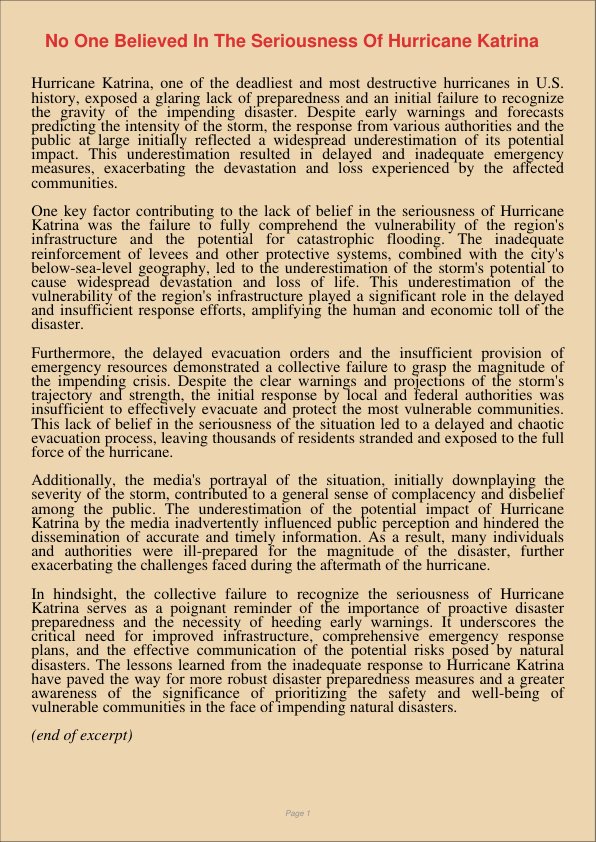No One Believed In The Seriousness Of Hurricane Katrina
Dec 31, 2023
one believed
hurricane katrina
Philosophy
Visual Arts & Film Studies
Hurricane Katrina, one of the deadliest and most destructive hurricanes in U.S. history, exposed a glaring lack of preparedness and an initial failure to recognize the gravity of the impending disaster. Despite early warnings and forecasts predicting the intensity of the storm, the response from various authorities and the public at large initially reflected a widespread underestimation of its potential impact. This underestimation resulted in delayed and inadequate emergency measures, exacerbating the devastation and loss experienced by the affected communities.
One key factor contributing to the lack of belief in the seriousness of Hurricane Katrina was the failure to fully comprehend the vulnerability of the region’s infrastructure and the potential for catastrophic flooding. The inadequate reinforcement of levees and other protective systems, combined with the city’s below-sea-level geography, led to the underestimation of the storm’s potential to cause widespread devastation and loss of life. This underestimation of the vulnerability of the region’s infrastructure played a significant role in the delayed and insufficient response efforts, amplifying the human and economic toll of the disaster.
Furthermore, the delayed evacuation orders and the insufficient provision of emergency resources demonstrated a collective failure to grasp the magnitude of the impending crisis. Despite the clear warnings and projections of the storm’s trajectory and strength, the initial response by local and federal authorities was insufficient to effectively evacuate and protect the most vulnerable communities. This lack of belief in the seriousness of the situation led to a delayed and chaotic evacuation process, leaving thousands of residents stranded and exposed to the full force of the hurricane.
Additionally, the media’s portrayal of the situation, initially downplaying the severity of the storm, contributed to a general sense of complacency and disbelief among the public. The underestimation of the potential impact of Hurricane Katrina by the media inadvertently influenced public perception and hindered the dissemination of accurate and timely information. As a result, many individuals and authorities were ill-prepared for the magnitude of the disaster, further exacerbating the challenges faced during the aftermath of the hurricane.
In hindsight, the collective failure to recognize the seriousness of Hurricane Katrina serves as a poignant reminder of the importance of proactive disaster preparedness and the necessity of heeding early warnings. It underscores the critical need for improved infrastructure, comprehensive emergency response plans, and the effective communication of the potential risks posed by natural disasters. The lessons learned from the inadequate response to Hurricane Katrina have paved the way for more robust disaster preparedness measures and a greater awareness of the significance of prioritizing the safety and well-being of vulnerable communities in the face of impending natural disasters.
